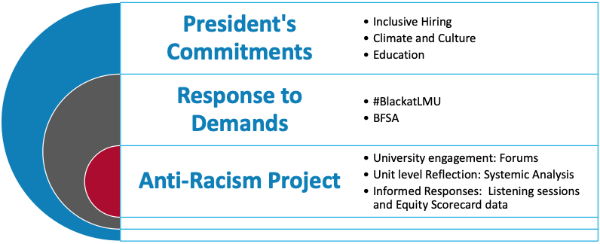de·mand
noun
plural noun: demands
- an insistent and peremptory request, made as if by right.
“a series of demands for far-reaching reforms” (Google’s English Dictionary)
Contextualizing the demands of LMU’s Black community
What does it mean for different groups within LMU’s Black community to make demands of the university? Insistently and peremptorily, as if by right? Some in the university may wish for more conciliatory language — the language of common goals, collaboration, and negotiation. Demands may seem too harsh to our ears, even unreasonable. Yet, the time we are living in, with a growing collective awakening based on seeing the violence and death perpetrated on so many innocent Black people, has led Black people — along with their allies of all ages, races, gender identities, and religions — to demand change. This right to demand is based on the continued dehumanization and disrespect of Black people based in a brutal history of racism in the United States. In this context, the language of demands is required and exactly right. A right to demand that is based on waiting too long, witnessing repeated long cycles of laws and reforms, legislation and intentions, that never go far enough, never quite do enough to actually change these bitter patterns.
What does it mean for LMU to address demands?
What does it mean to address the demands of Black undergraduate and graduate students, Black faculty and staff, and to respect the experiences of Black alums, at LMU? At its most basic level, it means listening and responding. Recognizing and respecting that the demands come from a place of anger and frustration, yes, but also from a sometimes painful love and commitment to LMU. From this perspective, the demands represent a path forward to make the university a place where Black people are valued, respected, able to be fully themselves, and to thrive. And in thriving, contributing to the intellectual, spiritual, and cultural vibrancy of the university. This relationship between communal flourishing and university vitality reverberates outward for other groups, too – for Latinx, LGBTQ, API, Native American, Middle Eastern, Muslim, White, and others – creating a greater possibility for everyone, no matter who they are and where they come from, to experience the richness of a university community and an LMU education that fully embodies its mission.
What does LMU’s response to demands have to do with its mission?
How can addressing demands help us to embody the university mission more fully? We are talking about an education of the whole person, that recognizes and values all peoples in their fully embodied selves. An encouragement of learning that values the intellectual contributions of many traditions, communities, and cultures. And a service of faith and promotion of justice that is authentic and real, that respects and honors the lived experiences of all peoples. After all, don’t we all want to be part of a university that enables all members of its community to explore and live out their values, worldviews, cultures, and/or faith traditions, with greater integrity and meaning?
In sum, addressing the demands of the Black community at LMU means locating ourselves as a university in the world, reading “the signs of the times” and responding accordingly, out of our mission. LMU means all of us, as individuals and as part of the institution, we mean to change. As individuals, it means learning, struggling, and growing together in authentic ways that have meaning and integrity in order to educate students for their futures. As part of LMU’s anti-racism project, it means examining our structures, processes, programs, and operations in unit-level reflections and expanding our awareness through campus-wide conversations. It is true that living the LMU mission can at times feel more aspirational than we wish, and the progress we make, individually and collectively, may seem too small and too slow. But we have set our feet to the ground, we see the path we must follow, and we encourage each other, even as we collectively push our institution, to keep moving ahead. That is how we will bring this change to fruition.

Although not listed on this website, the university also acknowledges Black graduate students on the Westchester campus, which do not yet have a formal organization or informal affinity group, represented by the leadership of Steven Fuller, a graduate student in the School of Education. In addition, the Black Law Students Association (BLSA), under the leadership of Nicole Osunsanmi (President), Kayla Dillard (VP), Beatrice Greenberg (Advocacy Chair), and Eden Teferi (former President), has been working with the LMU Loyola Law School to effect change in the LLS curriculum and programs. Finally, the Presidential Black Advisory Council (P.B.L.A.C., co-chaired by Dr. Branden Grimmett, Associate Provost for Career and Professional Development and Dr. Bradley Stone, BCLA Associate Dean for Graduate Studies/Professor of Philosophy) represents a cross-section of Black faculty, staff, undergraduates, graduate students, law students, alums, and Board members that have been asked to come together to provide advice, feedback, and guidance to the university as part of the Anti-Racism Project.
The university reports its progress in addressing the demands of #BlackatLMU and BFSA each semester. Note that while the university actions to address the demands contribute to strengthening LMU’s Anti-Racism Project, addressing these demands represents a separate university responsibility and commitment.